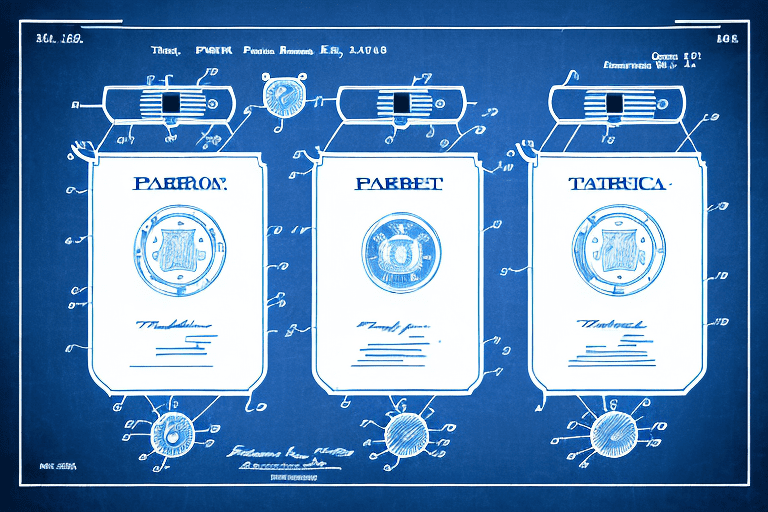In the world of professional examinations, the patent bar exam and the CAMS certification exam are both highly sought-after and prestigious qualifications. Each exam serves a distinct purpose and is designed to test a candidate’s knowledge and abilities in a specific field. Understanding the differences between these two exams can help individuals make informed decisions about their career paths and the opportunities that lie ahead. In this article, we will explore the basics of these examinations, compare their structures and subject matter, discuss career prospects after passing each exam, analyze the costs and return on investment, and provide guidance on how to choose the right exam for you.
Understanding the Basics of Examinations
Examinations play a crucial role in various professions, assessing individuals’ knowledge, skills, and competence in specific areas. Two notable exams that hold significance in their respective fields are the Patent Bar Exam and the CAMS Certification Exam. Let’s delve deeper into these exams to gain a comprehensive understanding of their purpose and significance.
What is the Patent Bar Exam?
The Patent Bar Exam is administered by the United States Patent and Trademark Office (USPTO), a government agency responsible for granting patents and registering trademarks. This rigorous examination is a prerequisite for individuals aspiring to become registered patent agents or attorneys.
One might wonder, what does this exam entail? Well, the Patent Bar Exam evaluates candidates on various aspects of patent law, including patentability, patent prosecution, and patent litigation. It tests their understanding of the intricate legal framework surrounding patents and their ability to navigate complex patent-related issues.
Passing the Patent Bar Exam is a significant achievement as it allows individuals to engage in the practice of patent law before the USPTO. This means they can represent clients in patent-related matters, file patent applications, and defend patents in legal proceedings.
What is the CAMS Certification Exam?
Now, let’s shift our focus to the CAMS Certification Exam, which stands for Certified Anti-Money Laundering Specialist. This exam is conducted by the Association of Certified Anti-Money Laundering Specialists (ACAMS), a globally recognized organization dedicated to combating money laundering and financial crimes.
The CAMS Certification Exam is specifically designed for professionals working in the field of anti-money laundering (AML) and financial crime prevention. It serves as a benchmark for assessing their knowledge, skills, and expertise in this critical area.
What does the CAMS Certification Exam cover? Well, it evaluates candidates’ understanding of AML regulations, detection techniques, and risk management strategies. It tests their ability to identify and prevent money laundering activities, as well as their competence in implementing effective AML compliance programs.
Obtaining the CAMS certification not only demonstrates an individual’s expertise in AML compliance but also serves as a validation of their competence in the financial industry. It enhances their professional credibility and opens doors to exciting career opportunities in the ever-evolving field of financial crime prevention.
As we can see, both the Patent Bar Exam and the CAMS Certification Exam play vital roles in their respective domains. They serve as gateways for individuals to enter specialized professions and showcase their knowledge and expertise. These exams not only validate their skills but also contribute to maintaining high standards of professionalism and competence within their industries.
Detailed Comparison Between the Two Exams
Exam Structure and Format
The patent bar exam and the CAMS certification exam differ in their structure and format. The patent bar exam consists of two sections: the multiple-choice examination and the patent drafting examination. The multiple-choice section assesses candidates’ knowledge of patent law and has a total of 100 questions. This section challenges candidates to demonstrate their understanding of various aspects of patent law, including patent prosecution and litigation procedures. On the other hand, the patent drafting section requires candidates to write a response to a hypothetical patent application, showcasing their ability to apply patent law principles to real-world scenarios.
In contrast, the CAMS certification exam follows a different format. It is solely multiple-choice and comprises 120 questions. These questions cover a wide range of topics related to anti-money laundering (AML) compliance. The exam evaluates candidates’ knowledge of AML regulations, risk assessment techniques, due diligence procedures, and regulatory frameworks. By answering these multiple-choice questions, candidates demonstrate their understanding of AML principles and their ability to apply them in various scenarios.
Subject Matter and Scope
The subject matter and scope of the patent bar exam and the CAMS certification exam differ significantly. The patent bar exam focuses exclusively on patent law and its application in the United States. It tests candidates’ understanding of patent prosecution and litigation procedures, as well as their knowledge of patentability requirements. This exam assesses candidates’ ability to interpret and apply patent laws to protect intellectual property.
Conversely, the CAMS certification exam covers a broader range of topics related to AML compliance. It includes international AML standards, typologies of money laundering, and techniques for identifying suspicious activities. This exam evaluates candidates’ knowledge of AML regulations and their ability to detect and prevent money laundering activities in various contexts. It requires candidates to have a comprehensive understanding of AML principles and practices.
Difficulty Level and Preparation Time
Both exams require extensive preparation due to their complexity and the depth of knowledge needed to succeed. The patent bar exam is widely regarded as one of the most challenging professional exams. It requires candidates to have a deep understanding of patent law and its intricacies. To excel in this exam, candidates must be well-versed in patent prosecution and litigation procedures, as well as the requirements for patentability. They must also be able to analyze complex legal scenarios and apply patent law principles effectively.
On the other hand, while the CAMS certification exam is also demanding, it typically does not require as much specialized knowledge as the patent bar exam. Candidates preparing for the CAMS certification exam need to have a solid understanding of AML regulations, risk assessment techniques, and due diligence procedures. They must also be familiar with various typologies of money laundering and be capable of identifying suspicious activities. While the depth of knowledge required may be different from the patent bar exam, candidates still need to dedicate significant time and effort to prepare for the CAMS certification exam.
The required preparation time for each exam can vary depending on the individual, but it is generally recommended to allocate several months to study thoroughly. Candidates should create a study plan that allows them to cover all the relevant topics and practice answering sample questions. By dedicating sufficient time to study and review the materials, candidates can increase their chances of success in both the patent bar exam and the CAMS certification exam.
Career Opportunities After Each Exam
Job Prospects After Passing the Patent Bar Exam
Passing the patent bar exam opens up a wide range of career opportunities for individuals interested in the field of intellectual property law. Registered patent agents and attorneys can work in law firms, corporations, or government agencies, providing legal advice on patent-related matters. They can assist inventors in securing patents, drafting patent applications, and representing clients in patent disputes.
Working as a registered patent agent or attorney in a law firm allows professionals to be part of a team that specializes in intellectual property law. They collaborate with other attorneys, paralegals, and support staff to provide comprehensive legal services to clients. This includes conducting patent searches, analyzing prior art, and preparing legal opinions on the patentability of inventions. Additionally, patent attorneys often engage in patent prosecution, which involves interacting with patent examiners at the United States Patent and Trademark Office (USPTO) to secure patent rights for their clients.
For those interested in corporate law, passing the patent bar exam can lead to exciting opportunities in the intellectual property departments of companies. Patent attorneys and agents in corporations play a crucial role in managing the company’s intellectual property portfolio. They work closely with inventors to identify patentable inventions, file patent applications, and ensure that the company’s intellectual property rights are protected. In addition, they may provide legal advice on licensing agreements, patent litigation, and intellectual property strategy.
Government agencies also offer career prospects for individuals who have passed the patent bar exam. Patent attorneys and agents can work at agencies such as the USPTO, where they examine patent applications, determine patentability, and issue patents. They play a vital role in promoting innovation and ensuring that patents granted meet the legal requirements set forth by the patent laws.
Career Paths After Acquiring CAMS Certification
After acquiring the CAMS certification, professionals in the anti-money laundering field can pursue various career paths within the financial industry. They can work as compliance officers or AML analysts in banks, financial institutions, or regulatory agencies. With the increasing emphasis on financial crime prevention and compliance, there is a rising demand for individuals with CAMS certification to help organizations meet their AML obligations.
As compliance officers, CAMS-certified professionals are responsible for ensuring that financial institutions adhere to anti-money laundering regulations and guidelines. They develop and implement policies and procedures to detect and prevent money laundering activities. Compliance officers conduct risk assessments, monitor transactions, and investigate suspicious activities to ensure the institution’s compliance with laws and regulations. They also provide training to employees on AML policies and procedures, and they act as a liaison with regulatory agencies during audits and examinations.
AML analysts, on the other hand, work closely with compliance officers to identify and investigate potential money laundering activities. They analyze financial transactions, customer profiles, and other relevant data to detect patterns and indicators of money laundering. AML analysts use sophisticated software and tools to identify suspicious activities and prepare reports for further investigation or reporting to regulatory authorities. They play a critical role in maintaining the integrity of the financial system and preventing illicit funds from entering the economy.
In addition to working in banks and financial institutions, CAMS-certified professionals can also find employment in regulatory agencies such as the Financial Crimes Enforcement Network (FinCEN) or the Office of Foreign Assets Control (OFAC). In these roles, they contribute to the development and enforcement of AML regulations, conduct investigations, and collaborate with other agencies to combat money laundering and terrorist financing.
Furthermore, CAMS certification can open doors to opportunities in consulting firms that specialize in anti-money laundering services. These firms provide advisory and compliance services to financial institutions, helping them enhance their AML programs and meet regulatory requirements. CAMS-certified professionals in consulting roles work closely with clients to assess their AML risks, develop and implement compliance frameworks, and provide ongoing support and guidance.
Exam Costs and Return on Investment
Cost of Taking the Patent Bar Exam
The cost of taking the patent bar exam includes both application fees and study materials. The application fee is currently $200 for individuals who qualify as an “attorney” and $100 for those who qualify as a “technical degree holder.” Additionally, candidates may choose to invest in study materials, such as review courses and practice exams, to enhance their chances of passing the exam.
Cost of CAMS Certification Exam
The cost of the CAMS certification exam varies depending on the candidate’s membership status with ACAMS. Members pay a reduced fee of $550, while non-members are required to pay a fee of $695. This fee covers the exam registration, access to study materials, and the administration of the certification process.
Comparing the ROI of Both Exams
When evaluating the return on investment (ROI) of the patent bar exam and the CAMS certification exam, several factors come into play. The earning potential and career advancement opportunities associated with each certification should be considered. While becoming a registered patent agent or attorney can lead to lucrative careers in intellectual property law, the demand for professionals with CAMS certification in the AML field is also significant. Ultimately, the ROI will depend on an individual’s long-term career goals and aspirations.
How to Choose the Right Exam for You
Assessing Your Career Goals
Before deciding on which exam to pursue, it is essential to assess your long-term career goals. If you have a strong interest in patent law and want to specialize in intellectual property, the patent bar exam may be the right choice for you. On the other hand, if you are passionate about combating financial crime and want to work in the regulatory compliance field, the CAMS certification exam can open doors to a fulfilling career in AML.
Evaluating Your Interest and Skills
Consider your interests and skills when choosing between the two exams. If you have a technical background and enjoy the intricacies of patent law, the patent bar exam may align better with your expertise. On the other hand, if you have a passion for finance, investigation, and compliance, the CAMS certification exam may be the more suitable option.
Considering the Financial Aspect
Lastly, take the financial aspect into account when making your decision. Evaluate the costs involved, including exam fees, study materials, and potential career opportunities. Consider the potential ROI and how it aligns with your financial goals and aspirations.
By understanding the differences between the patent bar exam and the CAMS certification exam, individuals can make informed decisions about their professional development. Whether you choose to pursue a career in patent law or AML compliance, both exams offer unique pathways to success. Consider your interests, skills, and long-term goals to choose the exam that aligns best with your aspirations and sets you on a rewarding career path.






